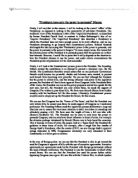The power of the President is limited to the power to persuade. Discuss.
“The power of the President is limited to the power to persuade.” Discuss. [45]
The President of the United States of America is often characterised as ‘the most powerful man in the world’. Why then, could he be accused of possessing no power other than the power to persuade? In his work ‘Presidential Power’ (1960), Professor Richard Neustadt famously claimed, “The president’s power is the power to persuade”. This can be considered a sweeping generalisation, but the growing power of presidential persuasion is certainly not to be ignored. However, to say that the only power the president possesses is the power of persuasion would be to go too far.
The President must be skilled in the art of persuasion as it does quantify a large portion of his role. Due to the separation of powers as laid out in the Constitution, “the President of the US is not the government of the US” (Bowles). The President sets the nation’s political agenda but all laws must first pass through Congress. Therefore, the President must negotiate and bargain with Congressmen in order to gain their support and be able to carry out his manifesto. As he is not the leader of his party, the President uses a number of methods to get his party colleagues ‘on-side’. He will work closely with the party leadership in both houses (this is currently Harry Reid in the Senate and Nancy Pelosi in the House of Representatives) and the party whips. Similarly, the Cabinet and Office of Legislative Affairs have a large part to play, with the latter in particular ‘working the corridors’ of Capitol Hill of the President’s behalf. A good choice of Vice President can also bring in other ideological wings or even geographical regions of the party- Joe Biden can be seen to ‘balance’ Obama, as he represents an older, slightly more traditional wing of the Democratic party. The President also may phone members of Congress before important votes- Johnson was particularly noted for his practice of this method. Likewise, Reagan often invited key Congressmen to breakfast at the White House the morning of important votes. Whether for a business meeting or a social event like the White House Easter Egg Roll, the President will use this time to try and win over the Congressman, ensuring they vote the way the President wants them too. The President may offer to help the Congressman in their next re-election campaign, by appearing with them on television or even travelling to their state. The President’s support will almost certainly ensure they will be re-elected, so this is a particularly effective method if the Congressman in question has suffered a loss of popularity or represents a swing area. Pork-barrelling is another effective method. This is where Congressmen attempt to gain money for a personal interest in their own constituency by adding ‘riders’ or ‘pork’ to a bill, even if the bill has little to do with the issue in question. For example, JFK gained the support of Senator Robert Kerr by promising his support for the Arkansas River Project if he voted in favour of Kennedy’s tax legislation, and Gerald Ford convinced Congressman Mitchel to support his jobs bill when he agreed to prevent the closure of an air base in his constituency. When a President is particularly desperate, running out of time, or facing a widespread loss of party support in Congress, he may go directly to the media. Obama did this in September 2011, when he threatened to veto the tax bill that had been amended beyond recognition by Congress. Public support is often stronger for the President than for Congress, so this threat of veto can be extremely significant, as Congress will tend to bow to the will of the President, fearing a public backlash if they rebel.








